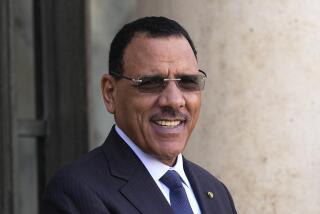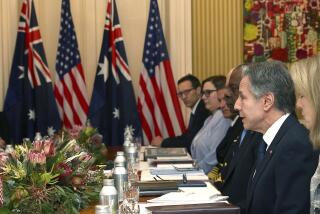Albright Vows to Increase U.S. Aid to Nigeria
- Share via
ABUJA, Nigeria — Secretary of State Madeleine Albright on Tuesday pledged to at least triple U.S. foreign aid to Nigeria, rewarding Africa’s most populous country for its democratic government and efforts against narcotics trafficking.
“I never stopped hoping that, during my time as secretary of State, I would be able to visit a Nigeria whole and free,” Albright told a news conference as Nigerian President Olusegun Obasanjo beamed in approval. “And here I am.”
She promised to seek a three- or fourfold increase in the $26.5 million in aid that the West African nation received during the last fiscal year. Such a boost in funds would make Nigeria by far the leading recipient of U.S. aid in sub-Saharan Africa.
And she said Obasanjo’s government, unlike the military regime it replaced May 29, “wants to work on” stopping the flow of illicit drugs through Lagos, Nigeria’s largest city. But she stopped short of saying this nation will be removed from a U.S. black list of countries that do not cooperate in the fight against narcotics.
A senior State Department official said later that Albright’s private talks here about illegal drugs focused on Washington’s demand that Nigeria extradite suspected traffickers. The official said the U.S. is seeking the return of several Nigerians accused of drug offenses.
Although nations are usually reluctant to extradite their citizens to face foreign justice, the official said that Obasanjo pledged to give careful consideration to U.S. requests.
“President Obasanjo has begun the work of restoring democratic institutions, fighting corruption and establishing accountability for past misdeeds,” Albright told the news conference.
Obasanjo, a military ruler in the late 1970s, won Nigeria’s first free and open election after 15 years of military dictatorship. The abrupt death in June 1998 of Gen. Sani Abacha, a particularly brutal autocrat, marked the beginning of the end for military rule.
Obasanjo sat silently while Albright and Nigerian Foreign Minister Sule Lamido responded to reporters’ questions.
Albright was unreserved in her praise for the new Nigerian government, although some human rights groups insist that abuses continue.
Human Rights Watch, in a statement issued earlier this month, said that Albright should welcome the steps Obasanjo has taken to improve human rights but that security forces continue to suppress dissent in the oil-rich Niger River delta.
The nongovernmental watchdog group urged Washington to press for an independent judicial inquiry into alleged human rights violations in the delta. But the official who attended Albright’s meetings with Obasanjo said the subject did not come up “in any depth.”
Albright acknowledged at the news conference that her promise of an increase in aid depends on Congress’ agreeing to restore much of the $2 billion that it cut out of the overall foreign assistance program for the fiscal year that started Oct. 1. President Clinton vetoed that bill Monday.
After years in which Nigeria received virtually no assistance because of its repressive government, the Clinton administration provided $26.5 million in the fiscal year that ended Sept. 30.
The administration originally had planned to reduce assistance to $20 million this fiscal year.
More to Read
Sign up for Essential California
The most important California stories and recommendations in your inbox every morning.
You may occasionally receive promotional content from the Los Angeles Times.










